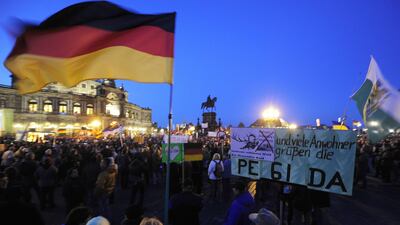Some time this weekend a small batch of Syrians will be relocated from Greece to Luxembourg as part of the European Union’s bitterly contested compulsory quota scheme to distribute 160,000 arrivals among 27 countries. It will be the first group to be officially reassigned from Greece. Meanwhile, the EU is making progress on a system to guard its single border and formulating common policies on immigration and deportation. (That’s the EU minus Britain, which is not taking part even in the quota-sharing scheme.)
Across the Atlantic, Canada, which goes to the polls on Monday, is playing political fantasy games with refugee numbers. The governing party proposes taking 20,000 Syrians over the next few years; the opposition parties propose more than twice as many.
So is the western world’s initial hysteria over the migrant flows subsiding? Not in the least. It’s important not to be taken in by the surface calm – particularly when the new Greek migration minister, Yannis Mouzalas, has been complaining about certain European countries’ “racist criteria” for refugees. It makes it harder to send them refugees they were willing to accept under the quota scheme, he chided, if they say “we want 10 Christians or 75 Muslims or we want them tall, blonde, with blue eyes and three children”. Describing it as very “insulting to the personality and freedom of refugees”, he said: “Europe must be categorically against that.”
Both in their laws and their rhetoric, many European politicians are categorically against exclusiveness and discriminatory practices. How then to read the mounting disquiet in Germany over the thousands streaming in as a result of what the refugees happily describe as “Mama Merkel’s” welcome?
German chancellor Angela Merkel’s party is divided and the interior minister who was formerly handling the refugee brief has openly questioned her policies, forcing her to appoint her chief of staff in his place. Meanwhile, every night, thousands chant “send them home” in the former communist east, where anti-immigrant sentiment has run consistently high.
The sense of fear is palpable, but fear of what? In a Dresden suburb, one man told a BBC camera crew he was worried that the “Germans will die out and everything will be mixed like in America”. Some Germans say they know of compatriots who are arming themselves for fear of a civil war. Some others openly express concerns about the “Islamisation” of Europe.
Even in Canada, where the scramble for refugees is regarded as a vote-getter, there seems to be some pickiness about who to save. Two former Canadian ambassadors, one of whom served in Syria, recently described the government’s intention to focus on “members of minority communities”, adding approvingly that “such a selection would be consistent with the UN Convention on Refugees”.
However it’s dressed up, there can be no denying the hesitancy over taking in large numbers of Muslim refugees. But why should a refugee’s religion matter? Is the West not quite so secular after all?
Some might argue that it is precisely because they are secular that western countries are behaving in this way. According to this argument, many in the West are doubtful that large numbers of Muslims – as well as conservative refugees of other faiths – would acquiesce in their secular articles of faith. The Munich-based newspaper Suddeutsche Zeitung recently pointed out the complexities of absorbing a million or more "newcomers with rigid moral codes" into a liberal society. "Well-educated engineers, doctors and economists are coming," the paper wrote. "But there are also plenty of illiterate people, stunned by their new world. Ultra-religious Muslims – and Christians – are coming face to face with a society that is indifferent to religion."
This is undeniable but so is this other ugly truth: many countries, including that great melting pot, America, have historically been discriminatory about immigration criteria. Adrienne Clarkson, Canada’s former governor-general, recently recalled how her family was nearly turned away as they tried to board a boat from Hong Kong after it had fallen to the Japanese in December 1941. “Someone noticed that we weren’t white and Canada at the time had a notorious restriction against Chinese immigration," she said. “Thankfully, another official told us to just get on the boat.”
Until 1920, Ellis Island, the legendary gateway to America for millions, allowed in mainly white immigrants. The Chinese, for instance, were excluded by a specific act from 1882. After the First World War, there was the gnawing fear that eastern and southern European immigrants would overwhelm America’s white native-born citizens because they were thought less willing to integrate, learn English and dispense with their “garlic-eater” and “spaghetti-bender” ways, as the derisory terms went.
As University of Massachusetts history professor and fourth generation Italian-American Vincent Cannato tells it, the demonisation of a specific kind of immigrant was so great that in 1893, The New York Times was describing Italy as "the land of the vendetta, the mafia, and the bandit" and southern Italians as "cutthroats" who sought "to carry on their feuds and bloody quarrels in the United States". Three years later, The Boston Globe was asking: "Are Italians a menace? Are they desirable or dangerous additions to our population?"
So great was the fear that white America would be subsumed that some sought to impose a literacy test for admission, hoping to keep out illiterate Italians. Eventually, Congress passed immigration quotas, which primarily targeted people from southern and eastern Europe and slashed Italian entry tenfold.
Slowly, some of the hysteria ceased.
Clearly, the current panic over refugees from the Middle East and the demonisation of them is neither new nor a permanent condition.
Rashmee Roshan Lall is a writer on world affairs
On Twitter: @rashmeerl


